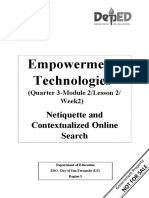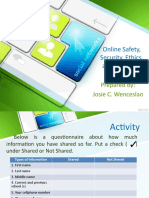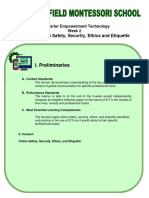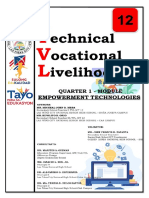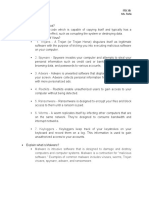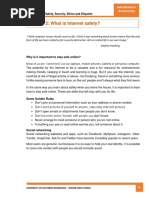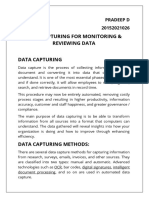Netiquette: Research On The Following
Netiquette: Research On The Following
Uploaded by
cristel bajitaCopyright:
Available Formats
Netiquette: Research On The Following
Netiquette: Research On The Following
Uploaded by
cristel bajitaOriginal Title
Copyright
Available Formats
Share this document
Did you find this document useful?
Is this content inappropriate?
Copyright:
Available Formats
Netiquette: Research On The Following
Netiquette: Research On The Following
Uploaded by
cristel bajitaCopyright:
Available Formats
Assignment no. 3 8.
Be Careful What You Post
Research on the following: The internet does not have a delete key, contrary to the popular
belief. Make sure that you will not be regretting a post because it might
>Netiquette
not be taken back
is short for "Internet etiquette." Just like etiquette is a code of polite
9. Be Careful Who You Meet Online
behavior in society, netiquette is a code of good behavior on the Internet.
Catfishing is a popular cybercrime where hackers use fake accounts
>Tips to stay safe online (Kaspersky.com)
to increase their profits.
1. Keep Personal Information Professional and Limited
10. Keep Your Antivirus Program Up To Date
There is no need to broadcast personal information such as home
Antiviruses makes sure your device can sort of fight back against
address and relationship status online.
the latest viruses and malwares.
2. Keep Your Privacy Settings On
>Information to be shared and not be shared online
As much as marketers use search histories for offers, so are hackers.
The internet is a place of sharing and interaction. However, too
We can change our privacy settings in various websites too.
much sharing may lead to bad circumstances. Here are top 5 things not
3. Practice Safe Browsing to share online according to trend micro:
Resist the urge to click on suspicious and dangerous sites, for it may 1. Confidential information about your identity – This includes your
be a bait for cybercrimes address, phone number, social security number, and birth date.
4. Make Sure Your Internet Connection is Secure 2. Financial information – includes necessary online banking
information.
Refrain from inputting crucial information (e.g. bank info.) while
connected to unsecure internet connections such as public wi-fi. 3. Your schedule
5. Be Careful What You Download 4. Work information – You don’t want to reveal confidential
information about your company or clients, and meddle with your
Do not download suspicious apps for it can be a malware, a harmful workmate’s personal lives.
software for users.
5. Passwords or information that could be clues to your password –
6. Choose Strong Passwords Don’t post information that could allow a scammer to figure out your
A unique password is harder to demystify for hackers and intruders. password.
7. Make Online Purchases From Secure Sites
Make sure that you shop from secure websites, so that critical
personal information will not be leaked to numerous internet thieves.
>Define the following: Check your search results for anything that may be damaging for your
reputation. If you spotted one, you can try to contact the site to have it
A. Malware- or malicious software, is any program or file that is
removed. If not, publish new content that can appear at the top of the
harmful to a computer user
list.
B. Spam- irrelevant or inappropriate messages sent on the Internet to a
2. Set up a comprehensive Google Alert.
large number of recipients.
This system may help you in tracking published articles containing your
C. Phishing- he fraudulent practice of sending emails purporting to be
full name and/or your business.
from reputable companies in order to induce individuals to reveal
personal information, such as passwords and credit card numbers. 3. Take advantage of people search tools.
D. Virus- is a malicious software program loaded onto a user's computer Ask people search tools like pipl.com or whitepages.com to remove
without the user's knowledge and performs malicious actions. some information from your profile when you think it is revealing too
much.
E. Worm- is a type of malicious software program whose primary
function is to infect other computers while remaining active on infected 4. Don’t allow anyone to tag you in pictures that might damage your
systems. reputation.
F. Trojan- (or Trojan horse) is a type of malware that is often disguised Inappropriate or private photos should not be leaked online, so
as legitimate software. It is any malware which misleads users of its true communicate with the person who tagged you if you feel uncomfortable
intent.
5. Think twice before you post.
G. Spyware- software that enables a user to obtain covert information
Do not post negative comments against the people around you and make
about another's computer activities by transmitting data covertly from
sure your posts are aligned to your ‘brand name’.
their hard drive.
H. Keylogger- s a type of surveillance software that once installed on a
system, has the capability to record every keystroke made on that >Things you might want to consider before posting something over the
system. This is usually used to obtain personal information from user. internet (according to: icsi)
I. Adware- (or advertising-supported software) is free computer 1. Who can see/read this post? Public posts can be seen by everybody,
software that contains commercial advertisements. E.g. games so make sure it is appropriate.
2. Will my post offend people, and am I okay with the potential results
of offending people? If the information in this post is shared with people
>How to protect your reputation online?
I didn't anticipate sharing it with, will that cause any problems?
Here are a few tips from All Business on how one can protect his
3. Is there hidden data (such as geotags in photos/video, for example)
reputation when searched online:
included in my post? Is it okay to share that information?
1. Conduct a simple Google search.
4. Knowing that this information will still exist online decades in the
future, do I really want to share it?
5. Are you sharing information about somebody else? Think about it:
How would you feel if somebody shared this information about you?
Consider asking for permission after discussing 1-4
You might also like
- Building A Key-Logger With Deep Learning and N-L-PDocument50 pagesBuilding A Key-Logger With Deep Learning and N-L-PHîmäñshû SîñghNo ratings yet
- Cybersecurity PrologueDocument32 pagesCybersecurity Prologuearun challaNo ratings yet
- We LikeDocument48 pagesWe LikeRahul H.No ratings yet
- Notes - Online Safety, Security, Ethics, and EtiquetteDocument2 pagesNotes - Online Safety, Security, Ethics, and EtiquetteErichelle EspineliNo ratings yet
- Lesson 2Document4 pagesLesson 2Jinn Allan LuañaNo ratings yet
- Online Safety and SecurityDocument2 pagesOnline Safety and SecurityJunald lawrenceNo ratings yet
- Rules of Netiquette: Lesson 2Document13 pagesRules of Netiquette: Lesson 2KaiNo ratings yet
- EmTech Module 2Document45 pagesEmTech Module 2Frantiska FartelióNo ratings yet
- Q1 Week2 Emtech FinalDocument3 pagesQ1 Week2 Emtech FinalAnalyn TorresNo ratings yet
- Empowerment Technologies: Quarter 1 - Module 2: Online Safety, Security, Ethics, and EtiquetteDocument12 pagesEmpowerment Technologies: Quarter 1 - Module 2: Online Safety, Security, Ethics, and EtiquetteArlene FlorNo ratings yet
- W1 em Tech 2024 2025Document9 pagesW1 em Tech 2024 2025veihn21No ratings yet
- LESSON 2. Rules of NetiquetteDocument2 pagesLESSON 2. Rules of NetiquetteAngelo QuintoNo ratings yet
- E Tech Lesson 2 Q. 3Document4 pagesE Tech Lesson 2 Q. 3lladera631No ratings yet
- Online Safety Security and EcthicsDocument5 pagesOnline Safety Security and EcthicsStephanie DecidaNo ratings yet
- Empowerment Technology - ACTIVITY 3Document3 pagesEmpowerment Technology - ACTIVITY 3Not Not D Luffy100% (1)
- Etech Q1M2Document7 pagesEtech Q1M2yel manonsongNo ratings yet
- 03-Online-Safety-Security-and-Netiquette 2Document4 pages03-Online-Safety-Security-and-Netiquette 2Dwaynne AcostaNo ratings yet
- Information and Communication TechnologiesDocument19 pagesInformation and Communication TechnologiesLsk MatammuNo ratings yet
- Lesson 2Document3 pagesLesson 2riazamaximojrNo ratings yet
- Rules of Netiquette: Online Security, Safety, and Ethics Internet Threats Protecting Reputation OnlineDocument2 pagesRules of Netiquette: Online Security, Safety, and Ethics Internet Threats Protecting Reputation OnlineLorieNo ratings yet
- ETech L2Document2 pagesETech L2MARY MAE PAREJANo ratings yet
- Lesson 2 Rules of Netiquette 1Document38 pagesLesson 2 Rules of Netiquette 1airaleighsaldoNo ratings yet
- E Tech Lesson e LectureDocument7 pagesE Tech Lesson e LectureChristine Barba RoscasNo ratings yet
- What Is Cyber Security?Document24 pagesWhat Is Cyber Security?api-19653075No ratings yet
- ETECH-WEEK-3-4 NewDocument8 pagesETECH-WEEK-3-4 NewStella Marie Carpina CominguezNo ratings yet
- Fundamentals of ProgrammingDocument7 pagesFundamentals of Programmingcharlene.dilig.mnlNo ratings yet
- ICF-9-week-7-8 2Document12 pagesICF-9-week-7-8 2Anna May BuitizonNo ratings yet
- L2 NetiquetteDocument3 pagesL2 NetiquetteJohn Mico CartillaNo ratings yet
- Etech Q1M2Document13 pagesEtech Q1M2yel manonsongNo ratings yet
- Online Safety, Security Safety and Etiquette PPT Lovely FDocument39 pagesOnline Safety, Security Safety and Etiquette PPT Lovely FLovely FrondaNo ratings yet
- Lesson 2 Online Safety, Security, Ethics and EtiquetteDocument58 pagesLesson 2 Online Safety, Security, Ethics and EtiquetteApril Globio100% (1)
- Lesson IiDocument49 pagesLesson IiFrankie “KIM” MataNo ratings yet
- Lesson 2 Rules of Netiquette 1Document38 pagesLesson 2 Rules of Netiquette 1eloisaalonzo1020No ratings yet
- Empowerment Technologies 2.1Document5 pagesEmpowerment Technologies 2.1Lore Isabel Mendoza PaclebNo ratings yet
- Lesson 2 Rules of NetiquetteDocument34 pagesLesson 2 Rules of NetiquetteKristine May QuisayNo ratings yet
- Empowerment TechnologyDocument2 pagesEmpowerment TechnologyCherryn Dorotayo QuiminsaoNo ratings yet
- Emp Tech L2Document16 pagesEmp Tech L2FEIH LUNAGNo ratings yet
- TVL-ICT-CS11 - w7-8Document6 pagesTVL-ICT-CS11 - w7-8Nixon BarcellanoNo ratings yet
- Empowerment Technologies: Netiquette and Contextualized Online SearchDocument17 pagesEmpowerment Technologies: Netiquette and Contextualized Online SearchLuis GrahamNo ratings yet
- EMTECH 11 Lesson 2 - Rules of NetiquetteDocument20 pagesEMTECH 11 Lesson 2 - Rules of NetiquetteErica Ana Ti-adNo ratings yet
- Module 2Document26 pagesModule 2Lawrence GalliguezNo ratings yet
- Online Safety, Security, Ethics, and Etiquette: Prepared By: Josie C. WenceslaoDocument44 pagesOnline Safety, Security, Ethics, and Etiquette: Prepared By: Josie C. WenceslaoJaysie FernandezNo ratings yet
- Empow Week 2Document10 pagesEmpow Week 2Ruel AcostaNo ratings yet
- TELUS Digital Safety and Privacy TipsDocument2 pagesTELUS Digital Safety and Privacy Tipsnishasoni1608No ratings yet
- NETIQUETTEDocument12 pagesNETIQUETTE95lineVmin BestFriendsForeverNo ratings yet
- Unit 2 Ict NetiquetteDocument2 pagesUnit 2 Ict NetiquetteEnforcement SectionNo ratings yet
- Online SecurityDocument12 pagesOnline SecurityAileen BagsicNo ratings yet
- Asistin Empotech ReviewerDocument5 pagesAsistin Empotech ReviewerJulie Ann Cabonce AsistinNo ratings yet
- Lormatet A. Sulsona: Prepared byDocument31 pagesLormatet A. Sulsona: Prepared byLormatet Altamirano SulsonaNo ratings yet
- Ict Grade 11 Empowerment Technologies: Subject Code Subject Title Lesso N Numb ER Lesson TitleDocument4 pagesIct Grade 11 Empowerment Technologies: Subject Code Subject Title Lesso N Numb ER Lesson TitleRichard Melvin GarciaNo ratings yet
- eTECH ACTIVITIES MODULE3Document3 pageseTECH ACTIVITIES MODULE3Kimsabu DoldamNo ratings yet
- Lesson 2.1 Online SafetyDocument37 pagesLesson 2.1 Online SafetyMary Joyce EnocNo ratings yet
- LAS - Empowerment Week 2.1Document9 pagesLAS - Empowerment Week 2.1Jaw Use EmpuestoNo ratings yet
- SHS ICT Empowerment Technologies Quarter 1 Module 2Document16 pagesSHS ICT Empowerment Technologies Quarter 1 Module 2Meiyuzu AiharaNo ratings yet
- Rules of NetiquetteDocument13 pagesRules of NetiquetteCristian Rey AbalaNo ratings yet
- Lesson 2 - Rules of NetiquetteDocument29 pagesLesson 2 - Rules of Netiquetterihammauna2No ratings yet
- Rules of NetiquetteDocument27 pagesRules of Netiquetteorangeshibuya99No ratings yet
- Online Safety and SecurityDocument9 pagesOnline Safety and SecurityAmylyn CaliguiaNo ratings yet
- Emtech (Module2)Document12 pagesEmtech (Module2)yel manonsongNo ratings yet
- Empowerment Technologies: ICT: 2nd Sem - 3rd GradingDocument30 pagesEmpowerment Technologies: ICT: 2nd Sem - 3rd GradingKal El AndayaNo ratings yet
- Internet Threats EMP Tech Week 2Document34 pagesInternet Threats EMP Tech Week 2Gil Bryan BalotNo ratings yet
- Your System's Sweetspots: CEO's Advice on Basic Cyber Security: CEO's Advice on Computer ScienceFrom EverandYour System's Sweetspots: CEO's Advice on Basic Cyber Security: CEO's Advice on Computer ScienceNo ratings yet
- Emptech12 Q1 W1 4Document33 pagesEmptech12 Q1 W1 4Daniel TaleñoNo ratings yet
- 1st em - Tech.Document3 pages1st em - Tech.Ma. Martina Delos SantosNo ratings yet
- Worksheet No. 5 (Online Transactions) 4. Explain Different Kinds of Online Threats. Ans. The Top 10 Most Common Online ThreatsDocument2 pagesWorksheet No. 5 (Online Transactions) 4. Explain Different Kinds of Online Threats. Ans. The Top 10 Most Common Online ThreatsSunil SinghNo ratings yet
- Explain What Is Virus? Give Some Types of Virus?Document5 pagesExplain What Is Virus? Give Some Types of Virus?JOHN ANDRE GICALENo ratings yet
- Group-F Term Paper Fall 22Document23 pagesGroup-F Term Paper Fall 22Md. Shah AlamNo ratings yet
- Unit 2 Lesson 2-4 14-43 Second WeekDocument30 pagesUnit 2 Lesson 2-4 14-43 Second Weekapi-326480150No ratings yet
- PostTest-ETech - With AnswerDocument3 pagesPostTest-ETech - With AnswerAngela D. De LeonNo ratings yet
- Network Security Source 2Document8 pagesNetwork Security Source 2John Llucastre CortezNo ratings yet
- Midterm Exam in EmTech Q1Document5 pagesMidterm Exam in EmTech Q1Venus NamocNo ratings yet
- Beyond The BinaryDocument2 pagesBeyond The Binaryblxx0981No ratings yet
- Duties and ResponsibilitiesDocument5 pagesDuties and ResponsibilitiesRomelyn AngadolNo ratings yet
- Sy0-501 4-10-2019Document174 pagesSy0-501 4-10-2019Enock AndersonNo ratings yet
- SET012 - Engineering Computation - Lecture 02-Computer SoftwareDocument37 pagesSET012 - Engineering Computation - Lecture 02-Computer Softwareatef10270No ratings yet
- Internet Threats EMP Tech Week 2Document34 pagesInternet Threats EMP Tech Week 2Gil Bryan BalotNo ratings yet
- Data Capturing For Monitoring & Reviewing Data Data CapturingDocument12 pagesData Capturing For Monitoring & Reviewing Data Data CapturingHighly ConfidentialNo ratings yet
- IA 124: Introduction To IT Security: Malware & Intrusion DetectionDocument27 pagesIA 124: Introduction To IT Security: Malware & Intrusion DetectionjohnNo ratings yet
- POinters Grade 5 Semi Final Test 2023 2024Document2 pagesPOinters Grade 5 Semi Final Test 2023 2024axel acaboNo ratings yet
- Midterm EmpotechDocument2 pagesMidterm EmpotechJessy BascoNo ratings yet
- 4 - Internet ThreatsDocument10 pages4 - Internet ThreatsLovely Jenn ReformadoNo ratings yet
- TVL Ict Css 12 q4 MRCN Week1 4Document27 pagesTVL Ict Css 12 q4 MRCN Week1 4Fernando OsorioNo ratings yet
- Rohit BishtDocument9 pagesRohit BishtMr NobitaNo ratings yet
- S 10Document80 pagesS 10shabir AhmadNo ratings yet
- Final Css 9-Q2-Module 2Document13 pagesFinal Css 9-Q2-Module 2Allan PaderoNo ratings yet
- EMC Cloud Solution - Security AssignmentDocument40 pagesEMC Cloud Solution - Security AssignmentwhatstubesNo ratings yet
- Security ThreatsDocument10 pagesSecurity ThreatsKabir SinghNo ratings yet
- Chapter 05Document61 pagesChapter 05legasic115No ratings yet
- Cat Pat Phase 1 Task 2Document26 pagesCat Pat Phase 1 Task 2ndlovumNo ratings yet






































